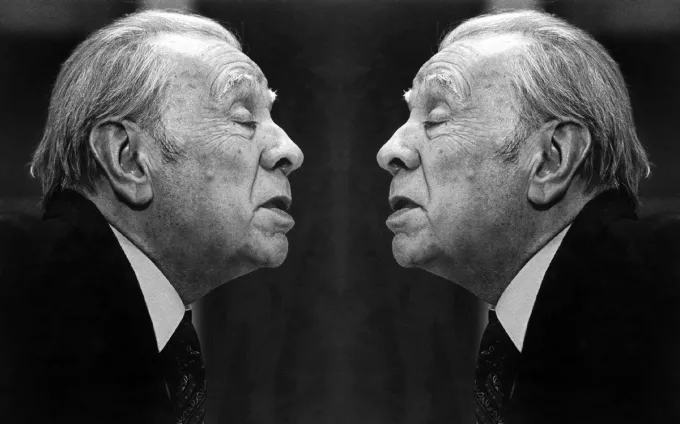“To the other one, to Borges, is to whom things happen. I walk through the streets of Buenos Aires and I delay myself, perhaps almost mechanically, to look at the arch of an entrance hall and the grillwork on the gate; from Borges I find out through the mail and I see his name in a list of professors or in a biographical dictionary. I like hourglasses, maps, eighteenth century typography, the taste of coffee and the prose of Stevenson; he shares these preferences, but in a vain way that turns them into the attributes of an actor. It would be an exaggeration to say that ours is a hostile relationship; I live, let myself go on living, so that Borges may contrive his literature, and this literature justifies me. It is not hard for me to confess that he has achieved some valid pages, but those pages cannot save me, perhaps because what is good belong to no-one, not even to him, but rather to the language and to tradition. Besides, I am destined to perish, definitively, and only some instant of myself can survive in him. Little by little, I am giving over everything to him, although I am quite aware of his perverse custom of falsifying and magnifying things. Spinoza knew that all things long to persist in their being: the stone eternally wants to be stone and the tiger a tiger. I shall remain in Borges, not in myself (if it is true that I am someone), but I recognize myself less in his books that in many others or in the laborious strumming of a guitar. Years ago I tried to free myself from him and went from the mythologies of the suburbs to the games with time and infinity, but those games belong to Borges now and I will have to devise other things. Thus my life is a flight and I lose everything and everything belong to oblivion, or to the other.
I do not know which of us has written this page.”
Jorge Luis Borges, El hacedor, Buenos Aires: Emecé, 1960
…….And perhaps I never will. But I leave that to Borges. I leave that admissibility, that confession for Borges to find. I leave it to him to find Plato’s allegorical cave. There are only shadows of me that remain now. Shadows dancing around that odd crevice beneath a basement door. Shadows dancing in shadows and becoming the one, single truth. The one, pure eternal being. That is now Borges. I have left all premonitions of fate to him and I have confessed now. There is nothing more to be said. Perhaps, the dawn to this dreary day will come when I will wake up, having completely immersed myself, I would say even drowned myself, in what, who and why Borges is. I am now the pathos of Arjuna’s words, waiting for the silken hue of the divine to come and tell me that the soul was, is and shall be. But, until then what will remain of me? I guess, in all probability, I will continue to fade and wander around the streets of Buenos Aires, taking in what the promised land was supposed to be, one thing at a time. The Argentine and his relationship with his country, poses the same question as Borges and me. Is the Argentine an Argentine because he was born in this place he calls home? Or because there is some indecipherable, immutable attribute that exists in all those who come to this land? Is the Argentine, Argentina or is the reverse true? Proceeding from the same line of thought, is Borges me or am I Borges? Is the sun ray bouncing off of the face of the moon and bringing it into luminescence, actually what the moon is? Is there a flawed way in which our perception is formed and developed? Why must our identities, the self and by extension the transmigration of the human body be looked at in cold, stoic silos? Perhaps, the original state of rest in the evolution of all beings is the realisation that there is no self? Perhaps that is what I am and perhaps that is who Borges is. I am Borges and Borges is me and therefore like the Upanishadic principle of the supreme consciousness we are everyone. And no one.
And so I think, I wrote these pages and so Borges wrote these pages and therefore perhaps, none of us wrote it.
Chaitanya Basotra is an 18-year-old law student who likes to listen and write. He is also the youngest WriteBeyond scholarship fellow at ALMA Magazine and writes for various columns.




